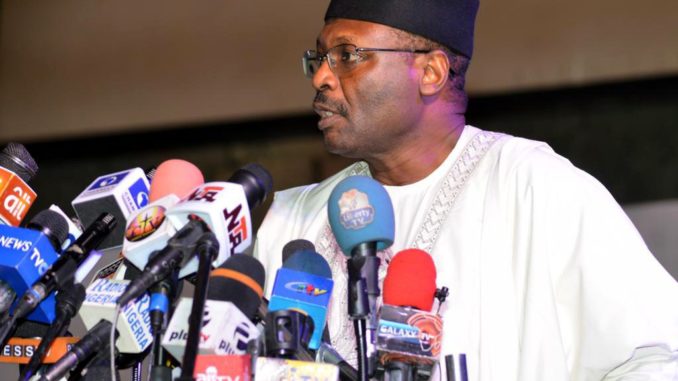
There is palpable apprehension in the air as Nigerians go to the polls on Saturday to elect their state governors and Houses of Assembly members in the final round of the 2019 general election. Primarily, the concerns and tensions centre on the intimidation/violence experienced by voters, Independent National Electoral Commission officials, and recurring logistical problems that greeted the presidential and National Assembly polls on February 23. With politicians adopting the win-at-all-costs attitude, the onus is on INEC and state institutions to conduct free, fair and credible elections.
In all, governorship election will hold in 29 of the 36 states. Since 2007, the other seven states have been holding staggered elections, but assembly seats will be contested in all the states. Being the elections that will determine public officials closest to the grass roots, there is really so much at stake. Politicians’ combative mood has infected the public, generating excruciating anxiety that there might be more violence this time.
Although the police, the military and other security agencies deployed their troops en masse for the February 23 ballot, violence marred the exercise in some states. A coalition of civil society organisations estimated that between 35 and 39 people were killed. The police said on Monday that they made 323 arrests during the polls. On the same weekend, Senegal, a West African country, conducted its own elections, mostly without any reported violence. The security breaches in states like Lagos, Bayelsa, Rivers, Akwa Ibom, Osun and Imo, where hoodlums killed and molested voters and election officials, should not be repeated.
Learning from its past mistakes, missteps and failures, INEC should make Saturday’s elections more credible. It was observed that issues of electoral violence, voter suppression as well as security personnel and party agents influencing casting of ballots, vote-buying, underage-voting and destruction of voting materials in Lagos, Bayelsa, Rivers, Kogi, Taraba, Bauchi, Kebbi, Borno and Yobe, leading to the death of civilians, dented the last polls. The Commonwealth Observer Group said, “Election-related violence and loss of life, which occurred in a number of places, are deeply troubling. Nigeria can do better. Violence has no place in a modern democracy…Those responsible should be held accountable.”
There is no doubt that INEC’s greatest challenge has always been logistics. As noted by the European Centre for Electoral Support, election is a time-bound event “that requires precision and exactitude” in the deployment of materials simultaneously across the country; it should do all within its power to ensure that all voting materials and personnel are delivered at all polling stations nationwide. It should liaise very closely and monitor support agencies, develop contingency plans and quickly raise the alarm when any aspect of the operation is being subverted by partners. A study at the University of Pretoria in 2012 concluded that since Nigerian politicians had “become impossible to manage,” given to ballot box snatching, hijacking and violence, electoral supply chain managers need to plan more carefully and enhance security to protect voting materials.
INEC Chairman, Mahmood Yakubu, and the RECs need quick response mechanisms to react fast to late or insufficient documents and personnel, disruptions and violence at far-flung stations. The safety of its personnel and of voting materials should be paramount: extra measures should be put in place to avoid the kidnapping, rape, killing and violent assaults on INEC staff.
If the performance of INEC has been disappointing, that of the security agencies has not been laudatory. Again, the acting IG, Mohammed Adamu, says security arrangements to make sure the elections go without a hitch have been heightened. Beyond the usual tough talk, security agencies should do much in safeguarding officials, voters and public property. It is appalling that despite our past experiences of violent elections, police and other agencies have not been able to come up with an effective, technology-backed strategy to counter criminals. Though the figure of two police officers (three soldiers were also reported killed) in the presidential election given by Adamu is an improvement, the challenge is to work towards violence-free polls on Saturday.
Election support agencies agree that prevailing conditions in places like Afghanistan, the Balkans, Colombia and Nigeria have led to the emergence of election violence prevention as a field of practice. The United States Institute of Peace adjudged Nigeria’s 2011 election cycle as the most violent in our history up till that time “though the quality of the polls had vastly improved compared to past elections.” As recommended by the United Nations Development Programme and others, voter education should be accompanied by very strong law enforcement to deter and punish offenders. INEC should secure adequate security cover to avoid a repeat of officials being held hostage by thugs and compromised security agents or being compelled to announce results. INEC needs to re-evaluate its operations this week. It should decentralise its activities to avoid logistical and operational challenges.
The neutrality of security agencies is paramount in guaranteeing free and credible elections. Until police chiefs, service chiefs and heads of paramilitary agencies are able to root out compromise by their personnel deployed for election duties and severely punish those who do, our elections will continue to be characterised by violence. The military have become too entrenched in our electoral process, a purely civil affair. Except in areas under emergency, we should aim at excluding troops from direct involvement in elections. When necessary at all, they should only be as back-up for police, Nigeria Security and Civil Defence Corps and other paramilitary forces.
The right to vote freely for the candidate of one’s choice is of the essence in a democratic society. There should be zero tolerance for thugs, miscreants and their sponsors who attempt to tamper with Saturday’s election. Voters should think critically when it comes to investing their valuable vote in candidates who will make decisions that absolutely will affect the quality of their lives in the next four years.
END

Be the first to comment